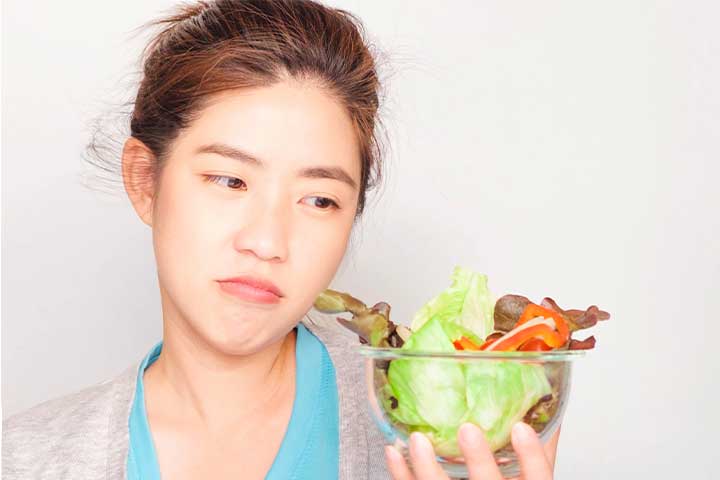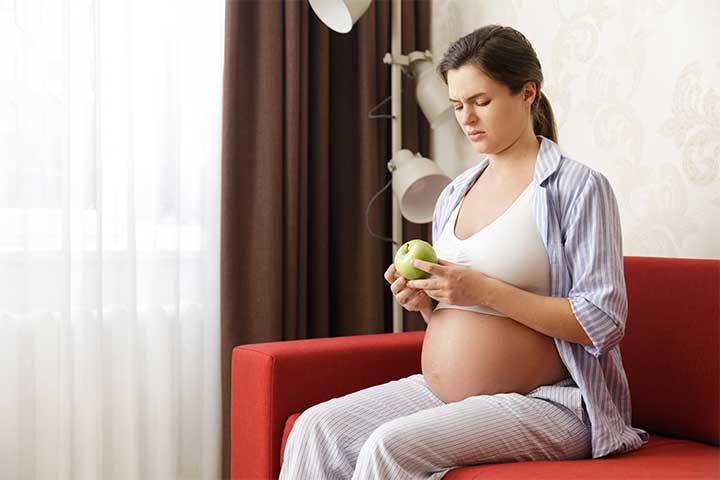
Image: Shutterstock
Pregnancy is a remarkable journey, but it can bring about some pretty unexpected changes to your body, including shifts in your appetite and food preferences. Understanding these changes is key to maintaining a healthy diet for both you and your growing baby. In this article, we’ll delve into the topic of appetite changes and food aversions during pregnancy, covering everything from what causes these shifts to how to maintain a healthy diet. Read on to know more!
What Are Food Aversions, And Why Does Appetite Change During Pregnancy?
Food aversions are a common experience during pregnancy. They’re essentially a strong distaste for certain foods or smells. On the flip side, appetite changes can involve increased cravings for particular foods or an overall decrease in appetite.
These changes are often attributed to hormonal fluctuations. Human chorionic gonadotropin (hCG), the hormone produced during early pregnancy, is to blame (1). It’s known to affect taste and smell perception and can lead to aversions and cravings. Additionally, changes in the levels of estrogen and progesterone also play a role in your evolving appetite.
Is It Normal For My Appetite To Change During Pregnancy?
Image: Shutterstock
Yes, absolutely. Appetite changes and food aversions are entirely normal during pregnancy. In fact, they’re experienced by the majority of pregnant women, to varying degrees. While they might be surprising or even frustrating, these changes are usually a sign that your body is adapting to nurture your developing baby.
However, it’s essential to keep an eye on the types of foods you’re avoiding. If you’re consistently shunning a particular group of foods that provide essential nutrients, it’s crucial to find alternative sources or discuss supplements with your healthcare provider.
When Are Food Aversions Likely To Start And End?
Food aversions can kick in as early as the first trimester, often coinciding with morning sickness. However, some women might experience them at any stage of pregnancy, and they may even persist throughout the entire nine months.
The intensity of food aversions can vary greatly. Some women find certain foods mildly unappealing, while others can’t bear the thought of them. Fortunately, most food aversions tend to subside after the first trimester. But it’s not uncommon for new aversions to pop up as you progress through your pregnancy.
What Food Aversions Are Common?
Image: Shutterstock
Food aversions during pregnancy can range from subtle to bizarre. While they’re highly individual, some aversions are more common than others. Here are a few:
1. Meats
The smell and taste of certain meats, like beef and chicken, can be off-putting to many pregnant women.
2. Strong Odors
Foods with strong odors, such as garlic, onions, or seafood, are often avoided.
3. Dairy
Some women develop aversions to dairy products, particularly milk.
4. Spicy Or Greasy Foods
The heat of spicy dishes or the heavy, greasy nature of fast food might be a no-go for many expectant mothers.
5. Coffee And Caffeine
The aroma and taste of coffee, along with the caffeine it contains, can become unappealing.
6. Healthy Foods
Surprisingly, some women develop aversions to healthy foods, like vegetables, fruits, or whole grains.
What Causes Food Aversions?
Image: Shutterstock
While hormonal fluctuations are the primary culprits, other factors can influence food aversions during pregnancy. Some of these factors include:
1. Heightened Senses
Your sense of smell and taste can become more acute during pregnancy, making certain odors and flavors overpowering.
2. Nausea And Vomiting
Morning sickness and the accompanying nausea can make you associate certain foods with discomfort, leading to aversions.
3. Sensitivity To Texture
Changes in your perception of texture can also play a role. Foods that are gritty, slimy, or overly chewy might suddenly be intolerable.
4. Psychological Factors
Emotional and psychological factors, like stress or anxiety, can exacerbate aversions or cravings.
How Can I Eat Well And Have A Healthy Diet?
Image: Shutterstock
Dealing with food aversions and appetite changes during pregnancy can be challenging, but it’s essential to ensure you and your baby receive the necessary nutrients. Here are some tips to help you maintain a healthy diet:
1. Diversify Your Diet
If you’re avoiding certain foods, try to find alternative sources of essential nutrients. For example, if you can’t stand milk, explore lactose-free options or substitute with fortified non-dairy alternatives like almond or soy milk.
2. Small, Frequent Meals
Eating smaller, more frequent meals can help you manage food aversions and nausea. This approach can help keep your energy levels stable and ensure you’re getting enough nutrients.
3. Stay Hydrated
If you’re having trouble with food aversions, staying hydrated becomes even more critical. Sip water throughout the day, and consider adding flavor to your water with slices of fruit if plain water doesn’t sit well with you.
4. Consult Your Healthcare Provider
If you’re concerned about the impact of food aversions on your diet, don’t hesitate to consult your healthcare provider. They can offer guidance and may recommend supplements to fill any nutritional gaps.
Appetite changes and food aversions are a natural part of pregnancy, driven by hormonal fluctuations and other factors. While they can be challenging, there are ways to adapt your diet to ensure you and your baby receive the necessary nutrients. Remember that these aversions are temporary and often subside after the first trimester. As always, consult your healthcare provider for personalized advice and guidance on maintaining a healthy diet during your pregnancy.
















